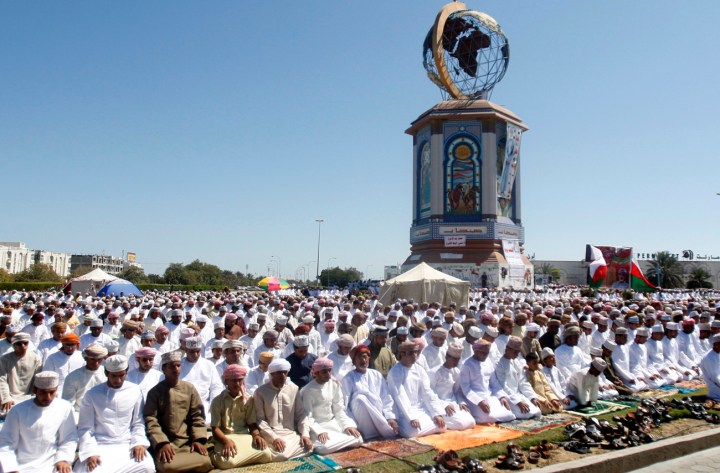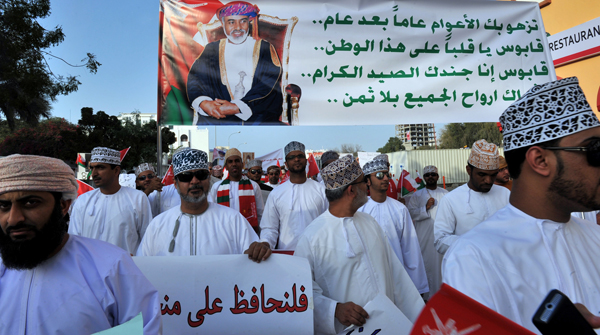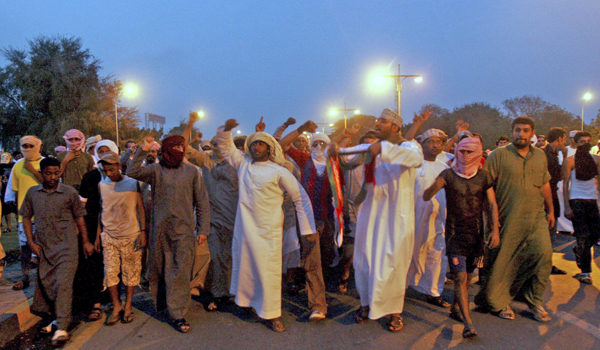Politics
Oh Man! Visiting Middle East’s latest flashpoint

The mountainous port country of Oman, once a tenuous Portuguese colony has, since late February, been the site of routine protests against the long rule of Sultan Qaboos bin Said al Said. The Sultan was hailed as a truly modern Middle Eastern ruler by his allies in the West, which has come to seem like a cruel joke. Indeed, this latest conflagration may well sum up the region’s troubles. By RICHARD POPLAK.
Muscat, Oman’s capital and biggest city, is in many respects a metaphor for the Gulf region. Residents in their forties remember when the Old Muscat Road was the only thoroughfare connecting the old city to the corniche and the newer neighbourhoods beyond. The road was carved into rock by Sultan Qaboos’s father’s regime, and during the rains was virtually impassable. Now, a boulevard takes its place. The pace of change has been dizzying and many Omanis are brutalised by the speed of modernisation. Those same citizens can remember when the city was shut off from the outside world, the gates locked at night. The other half of the population remember nothing other than Sultan Qaboos – a man who opened the country in so many ways, but has kept it shuttered in others.
Muscat’s corniche, and indeed much of the city, is watched over by brooding, battered forts that stand sentinel-like all over the country. The Portuguese-built main fort is the most impressive, but the smaller ones dotted here and there possess a cumulative power: You are being watched. Your movements are noticed. Be careful what you say. The forts no longer keep foreigners out, but remind locals to keep their words in. It appears they have lost their symbolic power.

Photo: Britain’s Queen Elizabeth meets with Sultan Qaboos bin Said at Al Alam Royal Palace in Muscat November 26,2010.REUTERS/ Sultan Al Hasani.
Oman has recently been rocked by protests in Sohar, its industrial port city, and elsewhere in the country. (Several protesters have been killed by troops opening fire on the crowds.) The country remains a curious place. In some respects resolutely modern, it is also fiercely traditional. Trade in the port, at the far end of the corniche, is still ancient and still plied by the same families that worked it before the country woke up to modernity in the early 80s. Dhows are pulled up to the brick dock and a frenzied crowd digs through the green netting laid out in shallow troughs, looking for choice catches. The fishermen have always been fishermen, and as far as they’re concerned, they always will be. There is no opportunity for upward mobility in Oman. The levers of economic power are jealously controlled by members of the Sultan’s court and they will loosen their grip only with the greatest reluctance. Every time the army fires a shot at unarmed protesters, it is viewed as the elite violently protecting their interests.
Sultan Qaboos has the eye of a consummate aesthete – his strict building codes, mandating that buildings can only adhere to simple Ibadhi tradition, have made of Muscat a stunning city, especially in contrast to the harshness of the surrounding mountains. This is an architectural conversation in negative, white set against stark black. Along the corniche, where this is most obvious, the only deviation is the large Shi’ite mosque – and even then, it’s a subtle change of form. The sloping, Farsi calligraphy works its way in a blue band across the structure, the verses from the Quran in blue and white, flecked with the occasional touch of red mosaic. The minaret, the corniche’s most obvious landmark, is woven with traditional patternwork. The sign by the door is, however, less than welcoming: For Muslims Only.
But which Muslims? The country is about two-thirds Ibadhi, which is neither Sunni nor Shi’ite but tangentially related to the breakaway Kharijite sect. Unlike Bahrain, there have been no elements of sectarian tensions to the protests. But the Shi’ites represent a merchant elite (as do Indians), while the Sunni can rely on close relationships with the neighbouring UAE. The Sultan has always expected obedience from his Ibadhi kinsfolk. For the past 40 years, he has maintained absolute control of almost every facet of Omani life. Benevolent as he may be, the country is still mired in the same oligarchic graft endemic in most of the region.
Average Omanis must work hard, and often run businesses on the side to make ends meet (families are large here – and it’s not uncommon to hear of 10 or 12 living together in one shambolic Mutrah residence). It was once fashionable in the Gulf to criticise Qaboos for making good on his country’s strategic importance by being the first Arab leader to host an American air base (the hourglass-shaped island of Masirat was the staging ground for President Jimmy Carter’s botched Desert One operation during the Iranian hostage crisis in 1980 – a fact the Omanis were not informed of in advance). Now, there’s the massive Seeb base just outside Muscat, the Thumrait Air Force base in the Dhofur region, and Khasam, overlooking the important Strait of Hormuz. In this, Qaboos was something of a trailblazer – there are now at least 12 major bases in other countries in the region.

Photo: Demonstrators carry banners during a march against the unrest which took place in neighboring city Sohar and expressing support for ruler Sultan Qaboos bin Said, in Muscat March 1, 2011. The banner reads, “Year after year you flourish… Qaboos you are the heart of this nation… Qaboos we are your loyal and true soldiers… We sacrifice our souls to you loyally and unconditionally.” Picture taken March 1, 2011. REUTERS/Sultan Al Hasani
This close relationship with the US has, unsurprisingly, been a cause of great upset. At the same time, it has had a pacifying effect—Omanis have always seen themselves as exempt from American aggression, and thus able to concentrate on building the country. And build it they have. I spoke with Saleh Alzakwani, executive director of the most successful publication company in Oman, Apec. “Oman is growing – you can see this with the infrastructure,” he told me. “Government is investing wisely, in roads, buildings, hospitals, schools. We do have a younger population – while 80% of the population is [native] Omani. We have a government that cares. Healthcare is free, and in the rural districts, you’ll see a plane waiting for the sick people. We have a high standard of health and education – oil revenues are wisely invested by the government. In [the industrial city of] Sohar, they’re putting in $30 billion of investment – smelters and such what. The more and more roads we build will raise the standards of the [remote] communities. Here it is very obvious – roads bring progress.”
All true. And yet the culture of entitlement and a reliance on government largesse hasn’t resulted in a quiescent youthful population. Indeed, what most young Omanis are looking for are jobs, along with a dismantling of the system of patronage that has long siphoned both money and opportunity from the economy. That vaunted education system, combined with the ever-seeping government teat, doesn’t produce graduates able to run the vastly complicated industries in Sohar. So, outsiders are brought in to do the heavy lifting, and Omanis are left to catch their fish.

Photo: Omani protesters shout slogans during a demonstration in the northern industrial town of Sohar in Oman February 28, 2011. Demonstrators blocked roads to a main port in northern Oman and looted a nearby supermarket on Monday, part of protests to demand more jobs and political reform that have spread to the sultanate’s capital. REUTERS/Jumana El-Heloueh.
To an outsider, Oman appears engaged in a baffling conversation between Islam and the modern world. The mosque is still the centre of Omani community life. At 22:00 on a Friday night, men and boys in brilliant white dish-dashes pour from the mosque, checking their cellphones, thumbing texts and eating the candy handed out within. This is the base of things, the mean, the deep sense of community that has remained relatively unchanged for centuries. But this is only one part of Omani life – the provincial part. I walk a few paces further, and Usher plays off cellphones, hip-hop blasts from cars. Minutes later, streaming out from a lower entrance, the women leave the mosque, the sequins on their veils catch the light of the streetlamps and sparkle brilliantly.
What has held society together, until now, is the sense of family and the obligation to community. Oman is a small country, and bonds are tight. For the most part, loyalties are to clan first. So long as those bonds remained tight—the theory went—and so long as familial and clan obligation act as regulators on behaviour, Oman would continue apace. But there have always been losers in this arrangement (freethinking individuals and, of course, young women, whose behaviour is furiously regulated), and modernity has a way of unfastening these ties.

Photo: Supporters of Oman’s ruler Sultan Qaboos bin Said carry placards reading “We are with you until our last breath” (L) and “In blood and spirit we love you Qaboos” during a march against the unrest which took place in neighboring city Sohar, in Muscat March 1, 2011. Picture taken March 1, 2011. REUTERS/Sultan Al Hasani.
And this is the nub of the issue. Yes, the Omani unrest is about jobs and opportunity and graft. And yes, it’s been influenced by the revolts in Tunisia, Egypt and elsewhere. But at the heart of the protests is the final fraying of a way of life that can no longer reconcile the modern with the traditional in such a tenuous, hodgepodge way. What we are witnessing is the carving of a new Muscat road. This is not so much about new ways of governing in the Middle East, it’s about new ways of being Middle Eastern. Young Omanis are laying down their demands, only a few of which will be met. The future of the country is now an unstable one. The populace has learnt to use its power. This conversation between tradition and modernity may take decades to unfold, and it will be a fraught period. How it unfolds may point the way to the sort of democracy that will shape the developing world for centuries. DM
Further reading:
- “Protests turn violent in Omani port” in the Financial Times;
- “S&P Places Oman’s Ratings on Review for Possible Downgrade” in Bloomberg.
Main photo: People gather during Friday prayers in Oman’s northern industrial town of Sohar March 4, 2011. Prayers were held in honour of those who lost their lives during protests in Oman demanding jobs and political reforms. REUTERS/Jumana El-Heloueh.






 Become an Insider
Become an Insider